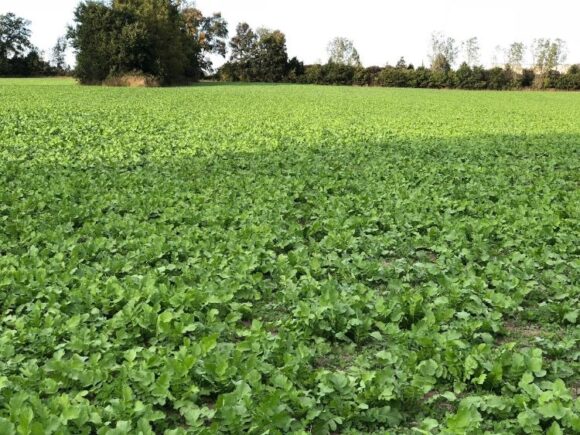A bipartisan bill proposed by federal lawmakers would provide farmers a discount on crop insurance premiums by planting cover crops.
The Conversation Opportunity and Voluntary Environment Resilience (COVER) Act, proposed last week by Sen. Sherrod Brown, D-Ohio, and Reps. Sean Casten, D-Ill., Elissa Slotkin, D-Mich., and Mike Bost, R,-Ill., would amend the Federal Crop Insurance Act to establish a program that rewards farmers who plant cover crops with a $5/acre discount on crop insurance.
The legislation is based off programs in place in Indiana, Iowa, and Illinois.
A cover crop is any crop grown to cover the soil and may be incorporated into the soil later for enrichment, according to the USDA. Cover crops, which include legumes, grasses, and forbs, help with soil erosion, improve soil health and crowd out weeds. They are typically planted in September or October.
A 2023 study published in the American Journal of Agricultural Economics found that counties with higher rates of cover crop adoption tend to have lower levels of crop insurance losses.
Crop insurance payments to farmers due to drought rose more than 400% to $1.65 billion between 1995 and 2020, while payments due to excess moisture rose nearly 300% to $2.61 billion.
“We are already seeing how the climate crisis is increasing the cost of the federal crop insurance program, and we know that it will continue to do so as more extreme weather events grow more frequent in the future,” said Rep. Casten.
The COVER Act seeks $360 million in funding through 2028. The legislation was introduced ahead of reauthorization of the Farm Bill, which expires at the end of September. The Farm Bill is an omnibus package of legislation renewed every five years.
Lara Bryant, deputy director, water & agriculture, Natural Resources Defense Council, called the COVER Act a “long overdue” update to crop insurance.
“For a small investment in cover crops through this bill, there is a huge return to the public in improved water quality, carbon sequestration, and resilience to drought and flood,” she said.
Photo: A field planted with cover crops. (Photo by Ricardo Costa, Michigan State University Extension)
Topics Agribusiness
Was this article valuable?
Here are more articles you may enjoy.



 AI Claim Assistant Now Taking Auto Damage Claims Calls at Travelers
AI Claim Assistant Now Taking Auto Damage Claims Calls at Travelers  State Farm Adjuster’s Opinion Does Not Override Policy Exclusion in MS Sewage Backup
State Farm Adjuster’s Opinion Does Not Override Policy Exclusion in MS Sewage Backup  AIG’s Zaffino: Outcomes From AI Use Went From ‘Aspirational’ to ‘Beyond Expectations’
AIG’s Zaffino: Outcomes From AI Use Went From ‘Aspirational’ to ‘Beyond Expectations’  Insurance Broker Stocks Sink as AI App Sparks Disruption Fears
Insurance Broker Stocks Sink as AI App Sparks Disruption Fears 


